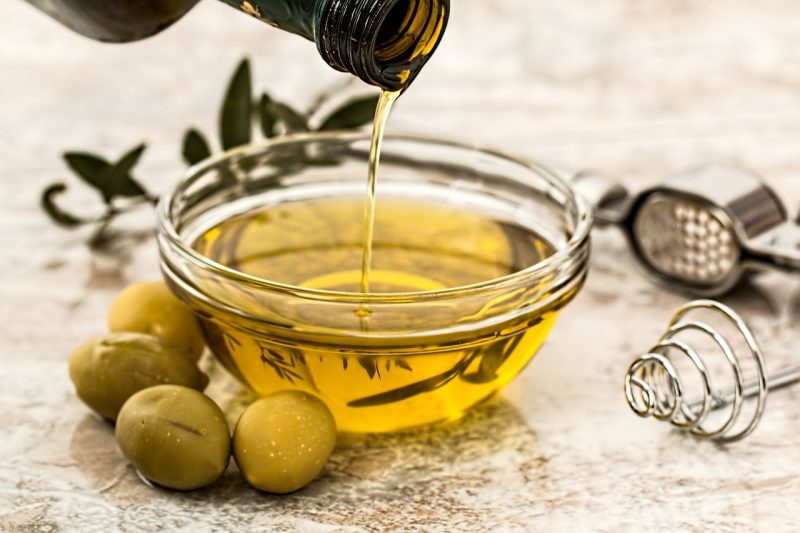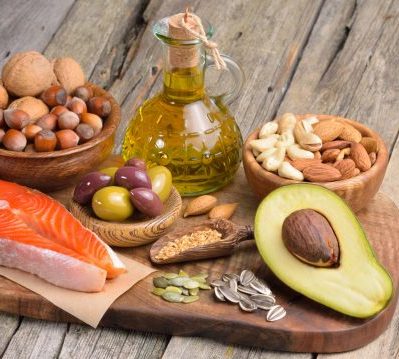For centuries, virgin olive oil has been touted as one of the healthiest oils on earth. But are these claims true? Is olive oil worth its hefty price tag?
The fats we eat can largely affect the inflammatory pathways in our bodies. They can also affect our cholesterol size and particle number, which can affect heart disease risk.
What’s more, they can influence brain health, joint, skin, tissue health, and more.
It’s important to know what fats you’re eating and what they do in your body.
What is Olive Oil?
Olive oil is a natural oil, most often produced in Mediterranean regions, extracted from olives. Olives are a fruit grown on olive trees.
Olive oil is a “pure” fat. It is composed of about 14% saturated fat and 11% polyunsaturated fat. The polyunsaturated fats are made up of omega-3s, omega-6s, and primarily, omega-9s (1).
Omega-9s make up about 73% of the total fat content. It’s the omega-9s that contribute to the health benefits!
In fact, in Mediterranean populations, where olive oil is most widely consumed, people experience less chronic inflammatory disease states and benefit from nutrigenomic, chemoprotective and anti-atherosclerotic activities of virgin olive oil compounds (2).
Here are the full details of the health benefits of olive oil.
10 Science-Backed Health Benefits of Olive Oil
1. Olive Oil is Highly Anti-Inflammatory and Anti-Bacterial
What’s more, its components also exhibit antibacterial action. Olive oil contains many nutrients that can inhibit or kill harmful bacteria, including H. pylori (5).
2. Olive Oil is Loaded with Antioxidants
3. Olive Oil is Anti-Aging
Aging is a time-dependent and progressive decline in many parts of the body and their physiological function. It can lead to a wide variety of related diseases such as degenerative and neoplastic disorders.
At a cellular level, aging is associated with genomic instability, telomere attrition, epigenetic alterations, loss of proteostasis, deregulated nutrient sensing, mitochondrial dysfunction, cellular senescence, stem cell exhaustion, and altered intracellular communication.
But, it’s not all bad news.
Olive oil, and specifically oleic acid, targets all these attributes of aging. In addition, olive oil’s other minor nutrients, like vitamin E and polyphenols, can alter and improve gene expression, pathways, and more (7).
In olive oil-consuming countries, these anti-aging attributes may be the root of less risk of aging-associated diseases, improved health, and increased longevity (8).
4. Olive Oil is Protective Against Heart Disease
Worldwide, heart disease is the most common cause of death (9). Believe it or not, it is less common in Mediterranean countries.
We already know that many of olive oil’s constituents are heart-protective. It reduces inflammation, cholesterol oxidation, and more (10). Additionally, olive oil can lower blood pressure by improving the health of artery walls. An early 2000’s study resulted in a reduced need for hypertension medications by 48% (11).
Another more recent review examined the effect of EVOO supplementation in healthy subjects and in individuals at cardiovascular risk. This review found that olive oil was anti-inflammatory, antioxidant and vasodilatory beneficial, leading to less atherosclerotic burden and disease (12).
5. Olive Oil Reduces the Risk of Strokes
When blood flow to the brain is disturbed or inhibited, either by obstructing it with a clot of bleeding out of the artery, it’s called a stroke.
After heart disease, stroke is the second most common cause of death in developed countries (13).
But, olive oil can help.
A 2014 meta-analysis found that those who consumed olive oil were at significantly lower risk of stroke than those who did not (14).
6. Olive Oil is Good for the Brain and May Fight Alzheimer’s Disease
Many fats are good for your brain. Olive oil is no exception.
First, olive oil may help remove the plaques associated with Alzheimer’s disease. These are called beta-amyloid plaques (15).
Next, a study of over 500 people from 2013 showed that olive oil improves cognition (16).
7. Olive Oil Does Not Cause Weight Gain
One fear many people have with adding extra olive oil is weight gain.
However, the Mediterranean diet and olive oil, have been shown to improve body composition.
Studies have shown no weight gain even with increased olive oil consumption (17), increased antioxidants in the blood, and even weight loss.
8. Olive Oil May Protect Against Type 2 Diabetes
Type 2 diabetes can be reduced with olive oil.
Like many healthy fats, olive oil is beneficial to blood sugars, decreasing blood glucose compared to carbohydrates and even improving insulin sensitivity.
One study of over 400 people, ages 55-80, found a 52% reduced incidence of diabetes when olive oil was added to the diet (18).
9. Olive Oil Contains Anti-Cancer Components
Olive oil does even more.
Like other diseases, cancer occurs at a lower rate in people in Mediterranean countries (19).
As discussed above, the antioxidants in olive oil reduce the oxidation of plaques and free radicals. Free radicals are likely part of the progression of cancer.
Lab studies show that olive oil can fight cancer cells themselves and by altering gene expression (20).
10. Olive Oil as Therapy for Rheumatoid Arthritis
Rheumatoid arthritis is another inflammatory disease and is an autoimmune disease characterized by pain and deformed.
Olive oil can help yet again. In studies, olive oil supplements reduce inflammatory markers and oxidative stress in those with rheumatoid arthritis. It works even better when combined with fish oil. Beyond inflammation numbers, the combo significantly improves handgrip strength, joint pain and morning stiffness in studies (21).
Bottom Line
Don’t be fooled. Just because olive oil’s attributes and benefits have been touted for decades, it’s as useful as ever for health. The health benefits extend from your brain to your heart to all your cells. Add it without cooking for the most benefit, over meats, vegetables, or even as an olive oil shot each day.
The best olive oil available is grown in Greece. This is because Greek olive oil is high antioxidant polyphenols which scavenge free-radicals and prevent oxidation of the delicate monounsaturated fatty acids found in olive oil. You want to always look for 100% organic cold-pressed extra virgin olive oil for maximum freshness.
















